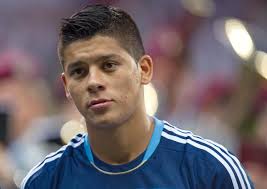By Andrew Warshaw
September 1 – The complications of a criminal case back home plus a thorny example of the pitfalls that come with third-party ownership (TPO) appear to have combined to hold up Manchester United’s £16 million purchase of Argentine World Cup star Marcos Rojo.
On the final day of the summer transfer window and an expected flurry of activity between clubs, Rojo’s move to Old Trafford from Sporting Lisbon, completed almost two weeks ago, was still being processed amid reports that he is yet to obtain the required work permit.
Rojo initially entered the UK to seal the deal on a tourist visa but is embroiled in an alleged legal altercation with a neighbour in Argentina in 2010. If Rojo were to be found guilty after a trial, he could be forced to carry out any penalty in his homeland.
Since signing for United, Rojo has missed three games and before Saturday’s 0-0 draw at Burnley, United manager Louis van Gaal said: “I’m manager of the biggest club in the world, but I can’t change the law.”
The transfer is also being held up by TPO which FIFA and UEFA are constantly targeting (to differing degrees) but which is a standard practice in most South American countries and increasingly in eastern European nations.
In Rojo’s case, Sporting Lisbon are in dispute with Doyen Sports Investments over how the £16 million fee is split between the two and the player’s previous club Spartak Moscow. To complicate matters further, the Premier League bans the process of third-party ownership while in Portugal it is allowed. Rojo can’t play for Manchester United until he come out of
FIFA’s executive committee is due to receive a report on TPO at its next meeting on September 25.
Contact the writer of this story at moc.l1744807345labto1744807345ofdlr1744807345owedi1744807345sni@w1744807345ahsra1744807345w.wer1744807345dna1744807345

